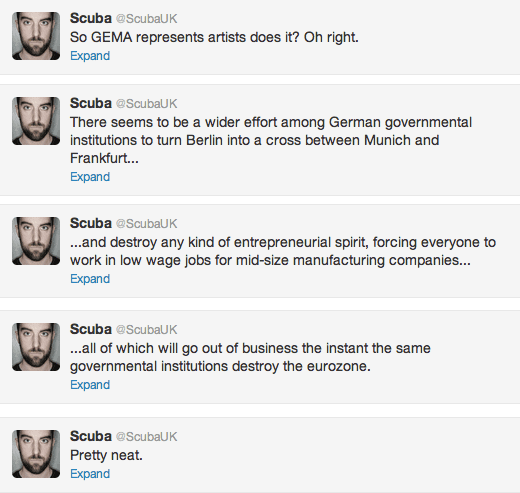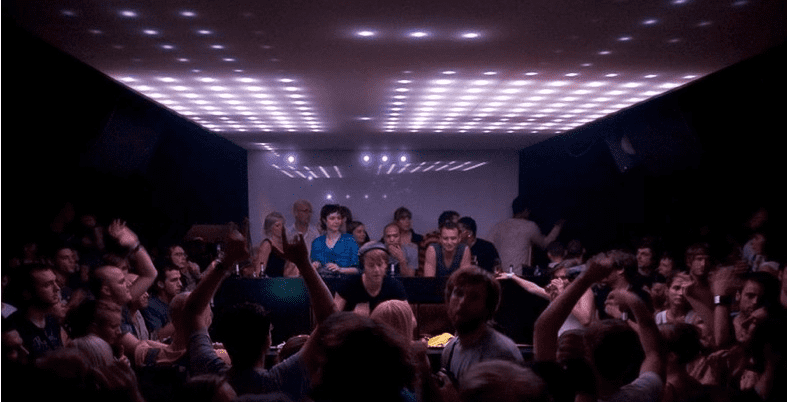It’s a story that’s been bubbling up quietly in recent months but finally seems to have reached boiling point. The row between Berlin nightclub owners and German music collection society GEMA continues over the latter’s proposal to reform the tariffs imposed on music venues.

6,000 people gathered in front of the Frannz Club in the Kulturbrauerei centre in Berlin last Monday to protest against GEMA’s plan to abolish the 12 existing flat-fee tariffs in favour of two percentage-based replacements. The plan has left world-famous clubs such as Berghain and Watergate fearing payments to GEMA increasing by as much as 1,400%.
On the face of it the news sounds ominous. After the Guardian’s coverage of the story, the Twittersphere has been awash with venues, DJs, producers and punters posting rallying calls to arms to block the motion. Clearly the GEMA reforms have broader implications beyond Berlin: artists, DJs and clubbers from around the world flock to the city on a weekly basis to experience and take part in its unique night life.
With bold, headline-grabbing statements being made by both sides and with very little information available from GEMA about exactly how the increased revenues will be reappropriated it’s hard to say how misguided or detrimental GEMA’s plans might be.
GEMA director Lorenz Schmid is keen to downplay the impact these reforms will have, stating in an interview with Billboard that “the new tariffs are reasonable. It’s quite logical that after such a long time there must be an end to clubs and discotheques paying a very favorable flat rate. We believe that ten percent of gross ticket sales is an appropriate charge and in this way we want our tariffs to be based on a flat rate tied to the cash benefits linked to the size of the facility and the admission charge.”

But that’s only one side of the story as GEMA’s plans extend beyond a simple 10% levy. The new system appears to have been designed to penalise the sorts of marathon parties that Berghain, KaterHolzig and Club der Visionaere specialise in, with an instant 50% tariff hike for parties lasting longer than five hours and subsequent 50% increases every three hours thereafter.
The Guardian suggest that Berghain could face total tariff increases of 1,400% whilst Watergate will see their bill rise from 10,000 Euros to 200,000 Euros per year. Perhaps the accuracy of these figures should be taken with a pinch of salt but it’s clear that nightclubs’ margins are going to be hit in some way unless they find a way to compensate. The owners of both Berghain and Watergate have claimed they’ll be forced to close if the tariff reform goes ahead.
The big boys may be kicking up a fuss, but it seems likely that they’ll be able to ride out the changes if they end up being implemented. After all, if anyone has benefitted from the cash influx of the easyJet set in the last 7 years it’s the likes of Berghain and Watergate. And why shouldn’t they pay their way when it seems as though they’ve had an easier ride compared to smaller clubs up until now?

The other important aspect of the debate which has been largely overlooked is where the extra revenue will actually go. The Black Dog put it bluntly on their Twitter: “We’ve checked our records and we’ve never been paid anything by Gema.” Perhaps it’s a debate for another time but it’s likely the extra cash will only bump up the royalty checks of bigger, more mainstream artists. The artists who create the music heard in underground clubs may stand to gain little from the changes.

Tiga took to Twitter to suggest a more radical approach for Gema: “In the new musical economy who makes all the money off others music: DJs. Who should GEMA be taxing; DJs. Not popular but true.” Whether the venues will take the hit, DJ fees will fall, ticket prices rise or transient semi-legal venues emerge to usurp the regulations remains to be seen. Either way, it seems certain that jobs are potentially on the line and spaces vital to the social and economic health of Berlin are under threat.
It’s clearly an emotive issue – and with good reason, as it impacts on so many parts of the industry we all hold dear – but whatever the outcome lets hope Berlin’s night time economy can ride out the GEMA meddling. An online petition against GEMA’s proposals has been set up at OpenPetition.
What do you think about the GEMA proposals? Will the increased tariffs force the closure of Berlin’s underground superclubs or are the likes of Watergate and Berghain just kicking up a fuss to try and protect their business?

10.22 AM
Nice post, glad to see someone asking some questions as it’s clearly not a black and white issue. Personally I think the big clubs are over-playing the impact the fee increase will have and lots of smaller venues stand to benefit from lower fees – that sort of grassroots help can’t be overlooked surely?
Low GEMA fees were never a major contributing factor to Berlin’s success therefore I don’t see how they’ll be the catalyst for its downfall.
I like Tiga’s idea of a DJ tax (perhaps only applicable to those earning above a certain amount, to protect the little guys!).
10.36 AM
From what i understand the only people who benefit from this organization are Top40 Classical people — those who put on the Magic Fucking Flute for the 300 millionth time, to entertain the ignorant culture-less rich. The contemporary composers, the experimental musicians, the underground dance music heads, people who are really innovating, people who really need and should get help, don’t see much from them ever.
10.41 AM
i have heard of them shutting down IMPROVISED MUSIC and FREE JAZZ clubs in the past. um… hallo!? that music is not COPY WRITTEN?? it’s not even WRITTEN DOWN FOR F__K SAKE!!!!
11.07 AM
it’s just posturing from watergate. steffen hacks claims they’d be forced to close if their bill increased by €190,000 per year but any businessman would probably threaten the same thing in this situation. the club could easily generate the extra €3,654 per week in order to cover the tariffs by increasing entry fees or drink prices by a nominal amount. can’t blame the man for wanting to maximise his profits though.
09.11 AM
@Alex –
You say: “I like Tiga’s idea of a DJ tax (perhaps only applicable to those earning above a certain amount, to protect the little guys!).”
I say: Sounds good on paper. Thing is, how many really tell the truth on their tax returns?!
01.11 PM
Whether they tell the true or not isn’t the point. Fact is they should shoulder some of the burden. Clubbers pay already pay their entrance fee, why should they foot the bill for Gema too? DJs making money far too easily here.
02.46 PM
GEMA is so quintessentially German. Socialism breeds institutions like GEMA.
06.56 PM
what GEMA neglected say is that this ” very favorable flat rate” people are paying is for nothing if artists like black dog get no money 4 their music. that is not “a debate for another time”, it is the ONLY debate.